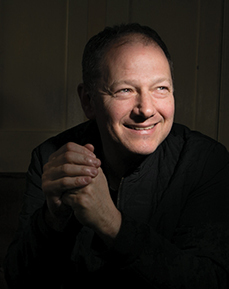 loading
loading
Where They Are NowThat’s entertainmentDavid Herskovitz ’84 makes theater with rigorous artistic principles—and a commitment to fun.  Julie BrownDavid Herskovits ’84 founded the Brooklyn-based Target Margin Theater to combine rigorous artistic principles with fun. View full imageWhen David Herskovits ’84 makes theater, it’s both small and large. On the one hand, Target Margin—the Brooklyn-based company he founded in 1991—works with modest budgets and intimate venues. On the other, its productions burst with big ideas and go-for-broke ambition; the New York Times has called Herskovits “ever venturesome” and his work “exhilarating.” This spring, the company has stayed true to form by staging Mourning Becomes Electra, a three-play cycle by Eugene O’Neill that relocates Aeschylus’s Oresteia to the immediate aftermath of the American Civil War. Y: This play gives tragic urgency to America’s unstable national identity. That’s pretty timely these days. H: I think any year is a good year to do Mourning Becomes Electra, but of course it won’t escape anybody’s notice that being an American and looking at how our polity is functioning today, and how our culture is functioning today, will cast our production into a particular light. And I embrace that. Context is everything, and in the theater context is extra-everything. Y: But you’ve been preparing this show for a while. H: I’ve been thinking about it for about eight years, and we’ve been working on it for about three years. Y: That’s a remarkably long time for a New York theater company, since so many shows rehearse for six weeks or less. Does it feel like a luxury to spend so long on a project? H: Institutional theater is set up a certain way, and mostly people work with those assumptions. And that’s okay. But I want to challenge those assumptions. And so we work hard to create the money and the time and the space where we can work on things. Y: What makes a project worth a commitment? H: I love art that makes us reengage with the world—a world that we know and that is also rich and strange. Both at once. So to some degree, the experience is mysterious: “I don’t know what it is. I can’t fathom it fully.” And yet at the same time, it’s not mysterious: “I get it. I can follow the story. I am entertained by it.” And those two things working at the same time, to me, is heaven. Y: That almost feels radical, asserting that downtown New York City art should be entertaining. H: It should be fun! Having rigorous artistic principles should never exclude the obligation to be engaging to an audience—to be entertaining, to be pleasurable. I love that! Don’t we all? And that’s the fear: you go to this dreadful, arty stuff that’s like taking medicine. But no! It should be fun. Y: Do you feel like your Yale background helped define your artistic vision? You majored in classics—Greek and Latin, not theater. H: So many things from my experience at Yale have informed my work and continue to. Classes with [theater faculty] Nikos Psacharopoulos and also Bart Teusch early on gave me strong tools to work with. My experience with the Dramat has been important too: I directed one of my very first plays for the Dramat; then I wound up as vice president my senior year—and look, here I am, a guy who runs a small nonprofit theater company. But what was really important was the turn of mind Yale allowed me to take. My restless embrace of difference, and my conviction that intellectual rigor and pleasure can thrive together, are I suppose just who I am. But these principles were fed in college by the people around me.
The comment period has expired.
|
|